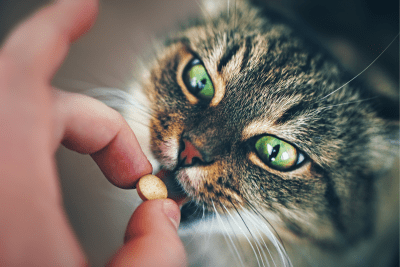 Written by Valerie Benka, Director of Programs for the Alliance for Contraception for Cats & Dogs (ACC&D)
Written by Valerie Benka, Director of Programs for the Alliance for Contraception for Cats & Dogs (ACC&D)
As COVID-19 emerged as a pandemic in early 2020, it severely disrupted the veterinary and animal welfare communities. It temporarily shut down spay/neuter programs just as kitten season was ramping up in the northern hemisphere, and it contributed to a major shortage of veterinary professionals and surgical capacity that continues today. This snowballed into lengthy waitlists for spay/neuter surgery in the U.S., leading to an estimated deficit of more than 2.7 million surgeries in 2022!
This difficult situation prompted the Alliance for Contraception in Cats & Dogs (ACC&D) to revisit ways to support animals, owners, veterinarians, and communities when surgery is off the table.
One option for cats who can be closely monitored is megestrol acetate, or MA. MA is a low-cost synthetic progesterone that is given in food. It has regulatory approval for cat and/or dog contraceptive use in some countries, and in other countries it is likely available for “off-label” use from a compounding pharmacy. (Those involved with TNR for several years might recall FeralStatÔ, which contained MA as an active ingredient.)
Over the years, many veterinarians have eschewed MA due to potential side effects, some of which are quite serious. Recognizing severely limited options for cats’ sterilization due to COVID-19, however, ACC&D committed to exploring ways that MA might be used more safely.
ACC&D consulted with experts and revisited prior research. They concluded that the risk of adverse effects could be reduced by administering a low dose of MA for short periods to closely monitored female cats. Doing so can “buy time” during spay delays. This has been borne out over the past two years as ACC&D consulted with shelters in the U.S. and Canada on pilot programs offering MA to cats awaiting spay surgery.
If your organization can spay cats in a timely manner, that’s your best option! But if you are struggling with a surgical backlog and are seeing unwanted pregnancies as a result, it’s worth considering how MA might be used as a “tool in the toolbox.” We answer questions below and recommend taking a close look at resources on ACC&D’s website and MA position statement. Their website profiles two organizations that have treated cats with MA during the pandemic, including examination forms and informational materials they gave to cat guardians—all for free!
Who is MA for? ACC&D recommends that MA be considered for healthy female cats that can be individually treated at prescribed times with an accurate dose, and whose health can be monitored over time. Intact queens weighing approximately 4 lbs. or more can be treated to prevent estrus.
Can you give MA to community cats? This is a surprisingly complicated question! ACC&D recommends that MA be considered for healthy female cats that can be individually treated at prescribed times with an accurate dose of MA, and whose health can be monitored over time. ACC&D historically advised against use of MA in free-roaming cat populations because this is difficult to achieve in community cats. The COVID-19 pandemic and severity of spay/neuter limitations invited revisiting this recommendation. In situations where there is a “spay delay” for female free-roaming cats, ACC&D now advises weighing the risks and benefits of short-term use of a low dose of MA, while striving to tick all the boxes noted above for safer use. The Toronto Humane Society implemented a pilot program with community cats with very positive results; more information is available here.
What about dogs? MA is approved in some countries to contracept dogs. As with cats, it carries risk, particularly when given at higher doses and/or longer durations. If you are interested in treating a dog with MA, we recommend talking to your veterinarian.
What is the recommended dose and treatment regimen? ACC&D’s support of MA for certain cat populations is limited to a low-dose regimen. A comprehensive review reported that for cats not showing estrus (“heat”) signs, 2.5 mg weekly (~0.625 mg/kg/week for a 4kg/8.8lb cat) for up to 30 weeks “can be considered relatively safe.” This is considered a low dose and is recommended in product inserts in most European countries.
What are the risks? Potential side effects in cats include diabetes mellitus, pyometra, adrenal gland suppression (Addison’s disease), mammary hyperplasia, and mammary cancer. Some side effects may resolve after stopping the medication. Effects are more likely at higher doses and/or longer periods of treatment. Regarding human safety, pregnant women should wear disposable gloves when handling MA and avoid inhaling dust from split/crushed tablets; immediately rinse skin or eyes if exposed. More information on risks is available at Romagnoli and Concannon 2003, Plumb 2005, Greenberg et al. 2013, and Romagnoli 2015.
Can I get MA from my veterinarian’s office? It will depend on your veterinarian, but to obtain the drug in a dose and format that is appropriate for cats, a compounding pharmacy might be required. In the U.S., a veterinary prescription is required for MA. Because it is not approved by the U.S. Food and Drug Administration (FDA) for cats, it would need to be prescribed under extra-label use guidelines, which include a veterinarian-client-patient relationship as well as other criteria.
Visit ACC&D’s resources and materials on MA for more comprehensive information. You can contact info@acc-d.org with questions. And, as always, please rely on the guidance of your veterinarian.


 Written by Valerie Benka, Director of Programs for the Alliance for Contraception for Cats & Dogs (ACC&D)
Written by Valerie Benka, Director of Programs for the Alliance for Contraception for Cats & Dogs (ACC&D)